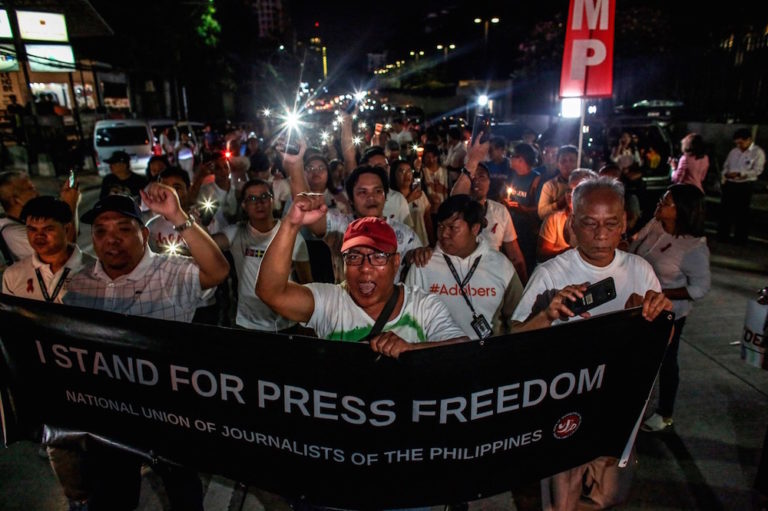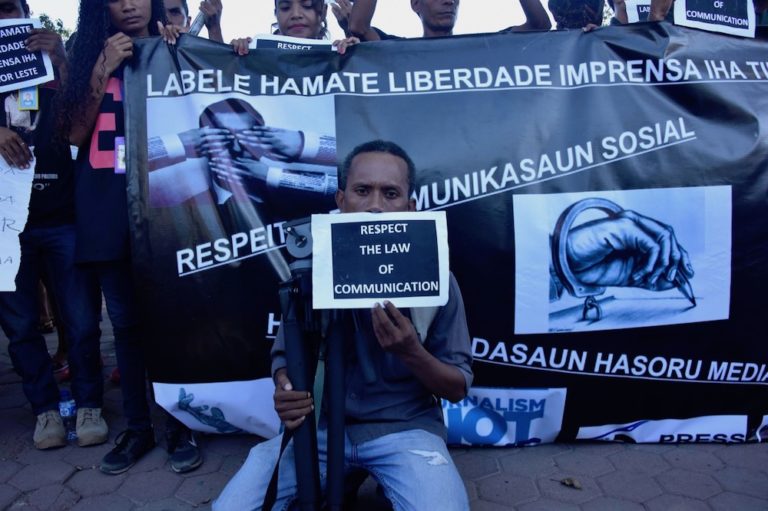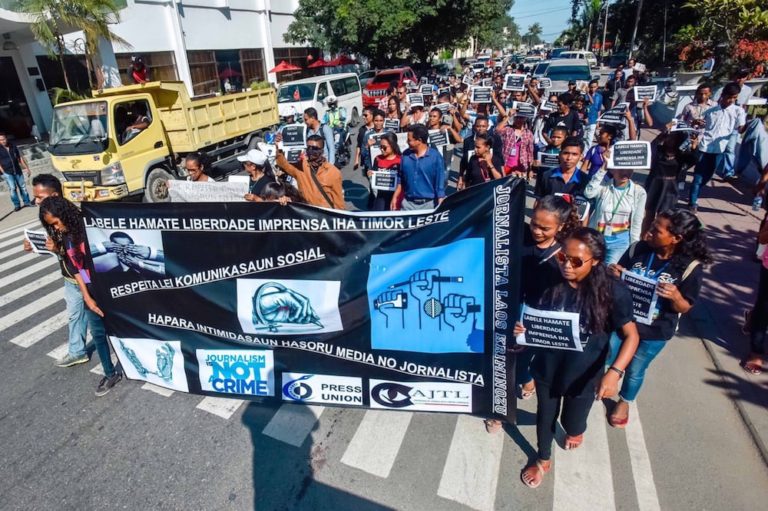(PINA/IFEX) – Indonesian and Australian journalists’ organisations plan to open a media safety office in East Timor, Australian Associated Press (AAP) reported on 25 May 1999. It comes amidst continuing threats to journalists trying to cover growing violence in East Timor in the lead up to a referendum on possible independence from Indonesia. **Updates IFEX […]
(PINA/IFEX) – Indonesian and Australian journalists’ organisations plan to
open a media safety office in East Timor, Australian Associated Press (AAP)
reported on 25 May 1999. It comes amidst continuing threats to journalists
trying to cover growing violence in East Timor in the lead up to a
referendum on possible independence from Indonesia.
**Updates IFEX alerts of 18 May, 10 May, 21 April, 20 April and 29 March
1999**
Australia’s Media, Entertainment and Arts Alliance (MEAA) said journalists
in East Timor had been under constant threat from armed militia for months,
AAP reported. It said the International Federation of Journalists (IFJ) has
agreed to provide it and its Indonesian counterpart AJI (Aliansi Jurnalis
Independen) funding to open the office. “This office will act as a contact
point for both local and visiting media,” MEAA federal secretary and IFJ
president Christopher Warren said in a statement.
On 24 May, the “Sydney Morning Herald” reported that the Australian embassy
in Jakarta had sought reassurances from Indonesian authorities over threats
made against the paper’s correspondent and photographer in Dili. The
Australian ambassador, John McCarthy, said he had asked embassy officials to
seek an assurance about the safety of correspondent Mark Dodd and
photojournalist Jason South after a group opposing East Timor independence
issued a statement accusing them of bias and declaring “blackmailers should
be stopped”.
The “Sydney Morning Herald” also reported Indonesia’s President B.J. Habibie
as ruling out the possibility of providing any special protection for
journalists working in East Timor. “It is against your own idea of press
freedom,” he said. Told of the threats, he said it was his responsibility to
take care of everybody in East Timor, where violence has been rising,
leading up to the August poll on possible independence. The “Sydney Morning
Herald” said that the president predicted many more threats would be made
against journalists in a disputed area like East Timor. “This is the
calculated risk you have to consider – it’s your risk,” he said. “If you
think it’s not worthwhile to come, then don’t come.”
The group which made the threats, the Forum for Unity, Democracy and
Justice, is linked to pro-Jakarta militia that have gone on killing rampages
in East Timor in recent weeks. On the weekend, Forum spokesman Basilio
Araujo said that Dodd and South created “more hatred in the hearts of the
pro-integration people whose consequences will be suffered by other
professional and unbiased journalists,” the newspaper reported.
Background Information
International journalists have reported they are being forcibly stopped from
going to areas in East Timor where there are reports of killings by
pro-Indonesian forces. On 18 May, AAP correspondent John Martinkus said
attempts by journalists and relief workers to reach the areas were stopped
at gunpoint by pro-Indonesian militia forces. Earlier, international
journalists attempting to cover a renewed rampage by pro-Indonesia
militiamen in the East Timorese capital, Dili, were attacked and threatened,
the “Sydney Morning Herald” reported on 10 May.
East Timorese are scheduled to vote in August in a referendum on possible
independence from Indonesia, which in 1975 invaded the former Portuguese
colony of 800,000 people. Six international media workers were killed during
the invasion. Organisations such as the IFJ and Australian colleagues have
called for investigations into continuing allegations they were deliberately
killed by Indonesian forces or forces under Indonesian control (see IFEX
alerts).


